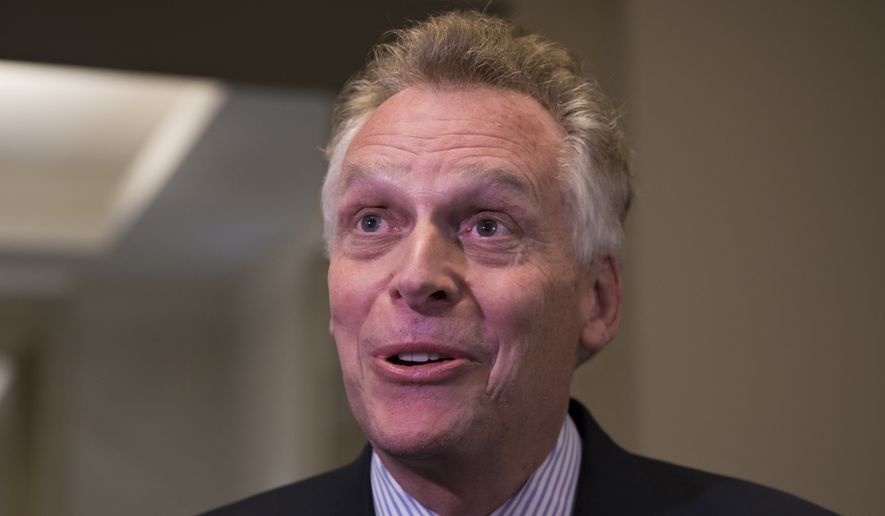Virginia Gov. Terry McAuliffe announced Monday that he has restored the voting rights of 13,000 individual felons, a move undertaken after the state Supreme Court rescinded a prior executive action that had restored the right to vote en masse to more than 200,000 former inmates.
The Democratic governor said individual restoration orders were mailed to the thousands of people who had their restored voter registrations canceled by the state on account of the July court ruling and that he intends to move forward in restoring others’ right to vote on a case-by-case basis in order to comply with the court’s decision.
“Restoring the rights of individuals who have served their time and reentered society is the right thing to do,” Mr. McAuliffe wrote in a memo outlining the policy. “Virginia’s felon disenfranchisement policy is rooted in a tragic history of voter suppression and marginalization of minorities, and it needs to be overturned.”
A voter registration application will be included with each individual restoration order that is mailed out, Mr. McAuliffe said during the announcement at the Civil Rights Memorial in Richmond. He said future restorations, which must be done on a case-by-case basis, will be prioritized by the order of the convicted felons’ release from prison.
“We will restore first those who have waited the longest,” Mr. McAuliffe said.
Individuals eager to have their rights restored may contact the governor’s office to request an expedited review. The secretary of the Commonwealth will review the records of all individuals who have completed their prison or jail sentences, as well as any supervised release, and forward recommendations to the governor, Mr. McAuliffe said. The names of those who have their rights restored will be published each month.
SEE ALSO: Donald Trump battles to retake Virginia, once-reliably red state gone blue
Republicans lawmakers, who successfully challenged the governor’s original decision to restore voting rights to more than 200,000 felons all at once, pledged to closely watch the process to ensure that laws are followed and rights are not mistakenly restored to anyone not yet eligible.
“The General Assembly will carefully review Governor McAuliffe’s process to determine if he followed the legal requirements,” said state House of Delegates Speaker William J. Howell.
He said lawmakers also would seek to shed further light on the policy decision.
“Undoubtedly, the governor has restored the rights of some deserving citizens. But there is also no doubt that he has restored the rights of some odious criminals,” said Mr. Howell, Stafford Republican. “The people of full Virginia deserve a full explanation of the policy, specifically why he is restoring rights to habitual offenders, those who have not yet paid back their victims, and the Commonwealth’s worst sex offenders.”
In their lawsuit, Republican lawmakers argued that the decision to restore voting rights en masse violated the state’s separation of powers by effectively suspending Virginia’s ban on voting by felons and that Mr. McAuliffe had ignored decades of practice that made clear the governor could restore such rights only on a case-by-case basis.
The stakes of the legal battle were high. Virginia is considered a battleground state in this year’s presidential election, and Democrats expect that the vast majority of felons who could vote again would vote for Democratic nominee Hillary Clinton rather than Republican nominee Donald Trump.
SEE ALSO: Cathy Lanier leaves D.C. police on own terms after serving three administrations
Republican Party of Virginia Chairman John Whitbeck criticized the governor’s actions, noting that nothing would have prevented him from restoring voting rights on an individual basis in the first place.
“But the governor’s desire to cut corners and do things the easy way in an effort to help Hillary Clinton at the polls in November created confusion and heartache for tens of thousands of Virginians,” Mr. Whitbeck said.
Mr. McAuliffe, a staunch Clinton ally, on Monday sought to specifically address the allegations of playing partisan politics.
“To those who would say my motivations are political, I would ask you to consider two things — first, extending voting rights to individuals who are living, working and paying taxes in our communities is not a partisan act,” Mr. McAuliffe said. “The order I signed in April restores rights to everyone, regardless of their race, religion, economic status, geographic location or their political affiliation.”
Senate Majority Leader Thomas Norment, Gloucester Republican, questioned how the governor had sought to restore voting rights.
“Had the governor followed the Constitution of Virginia on April 22 when he initially attempted this, those affected by today’s announcement might not have endured the roller-coaster of bureaucratic incompetence his executive overreach exposed,” Mr. Norment said in a statement. “This episode should serve as a cautionary tale for those who would declare policies by fiat, circumventing the protections enshrined in the Constitution of Virginia.”
• Andrea Noble can be reached at anoble@washingtontimes.com.




Please read our comment policy before commenting.